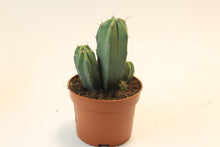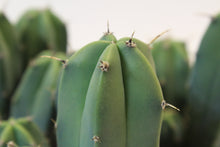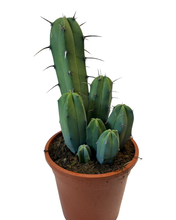Myrtillocactus geometrizans is part of the Cactaceae family and its native range is Mexico. It has a striking blue-green colour and branching, candelabra structure. Try to avoid touching the plant's tissue with your bare hands as you may leave behind an oily fingerprint, this is due to the cactus being covered in farina or epicuticular wax; “epicuticular waxes strongly influence the wettability, self-cleaning behaviour and the light reflection at the cuticle interface” (Bargel et al., 2006a).
Genus name comes from the Latin word myrtillus meaning ‘bilberry’ as the fruits of this plant are similar to those of the bilberry (Vaccinium myrtillus). The specific epithet comes from the Latin geometria meaning ‘geometry, land-survey’.
Light: Allow the plant to see the sun for as many hours of the day as possible; the plant ought to be able to see sun from where it is positioned in the home. A south facing window is ideal; the blue coloration will become more saturated with the proper sunlight.
Water: Allow the potting mix to dry out completely in between waterings; Myrtillocactus geometrizans prefer to stay on the dry side. During the winter water very infrequently, if at all, this will encourage flowering during the spring.
Potting mix: A well draining mix composed of perlite, grit and horticultural sand and a small amount of coco coir.
Fertilising: Feed every few waterings during the growing season. You can dilute fertiliser to half the recommended amount but never add more.
Temperature: 15-26˚C.
Humidity: Low humidity; if the humidity is particularly high, good ventilation is key to prevent mildew and fungal disease.
Myrtilllocactus geometrizans are non-toxic, but spiky so keep out of reach of pets and children.







